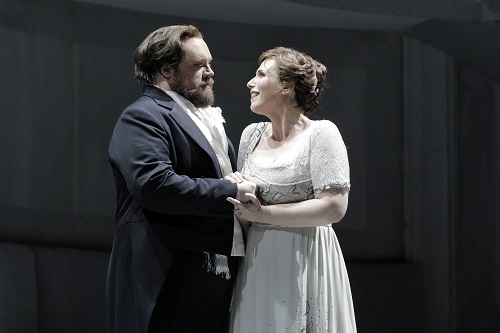 United States R. Strauss, Arabella: Soloists, orchestra and chorus of San Francisco Opera / Marc Albrecht (conductor), War Memorial Opera House, San Francisco. 16.10.2018. (HS)
United States R. Strauss, Arabella: Soloists, orchestra and chorus of San Francisco Opera / Marc Albrecht (conductor), War Memorial Opera House, San Francisco. 16.10.2018. (HS)

(c) Cory Weaver/San Francisco Opera
Cast:
Arabella — Ellie Dehn
Zdenka — Heidi Stober
Mandryka — Brian Mulligan
Matteo — Daniel Johansson
The Fiakermilli — Hye Jung Lee
A Fortune-Teller — Jill Grove
Countess Adelaide Waldner — Michaela Martens
Count Waldner — Richard Paul Fink
Count Elemer — Scott Quinn
Count Dominik — Andrew Manea
Count Lamoral — Christian Pursell
Production:
Director — Tim Albery
Production Designer— Tobias Hoheisel
Lighting Designer — David Finn
Chorus Director — Ian Robertson
Another strong cast, insightful conducting, and glorious orchestra work — hallmarks of this fall season at San Francisco Opera — made compelling stuff of the musical side of Richard Strauss’ Arabella, the first here in 29 years.
Director Tim Albery drew individual performances that felt real and psychologically valid. He leaned toward simplicity and held down any effort toward histrionics to make up for relentlessly gray Tobias Hoheisel-designed sets, and mostly black-and-white costumes. The production, updated from the original 1860s to 1910, is shared by Santa Fe Opera, Minnesota Opera and Canadian Opera. Playing off the black-and-white scheme, lighting designer David Finn got some mileage from casting shadows of the singers on the blank walls, particularly in the final scene.
The real treasure was the score, led by conductor Marc Albrecht in a long-overdue U.S. debut in the first of five performances, heard Tuesday in War Memorial Opera House. The rich complexity and layers of nuances in Strauss’ score blossomed impressively. Albrecht got the music to surge, only occasionally overwhelming the singers, ebbing and flowing seamlessly with the action.
The story centers on a title character whose beauty and charm let her toy with a cavalcade of eligible bachelors, until papa’s gambling losses put the family’s high-society life in Vienna in such jeopardy that she must marry for money, even if none of the suitors seems like ‘the right one.’ At the moment Arabella utters that phrase in Act I, Strauss sets harmonic complexity aside in favor of a simple diatonic tune, a turn that Albrecht and the orchestra floated like a fresh breeze.
The solution arrives in the form of Mandryka, drawn to Vienna by a photograph of Arabella. Between her and the landed, wealthy but country-shy widower, love blossoms, overcomes misunderstandings, and generally underlines the idea of that simple musical motif. Indeed, in the end, honesty makes a better basis for a long life together than Vienna’s high society might allow. (Also, this is an opera where the baritone gets the girl, and for all the right reasons.)
It’s all a bit ponderous for what’s intended as an elegant comedy of manners, but it has some terrific moments, and this cast relished them. These singers can act and can establish their characters and let them develop as they challenge each other. As Arabella and Mandryka, respectively, soprano Ellie Dehn and baritone Brian Mulligan delivered.
Dehn’s plush-textured, soprano established early on that this character was more than the social butterfly she seemed. A tall woman, she carried herself with elegance—in contrast to her younger sister, sung by the diminutive Heidi Stober. The Act I Arabella-Zdenka scene and duet, one of Strauss’ patented and sublime soprano-soprano pairings, was one of those aforementioned highlights.
Dehn’s duets with Mandryka and with her father, Count Waldner (baritone Richard Paul Fink), accentuated the richness in her voice, even if sliding off some high notes in her final monologue cost her a bit of the poise she carried throughout a long night of singing.
Mulligan’s supple baritone did not tire, and his impeccable technique made his solid, salt-of-the-earth portrayal of Mandryka even and free from low to high range. We could see and feel him overcome a painful shyness to forge human relationships, first with Count Waldner (Arabella’s father) and then with Arabella. He never overdid it even when, overhearing an unfortunate ploy by Zdenka, he believed Arabella had deceived him. The forgiveness they awarded each other in the final scene was well earned.
When we first meet Zdenka she’s dressed as a young man, hoping to forge a close relationship with her secret crush, a military officer who is, alas, desperately enamored of Arabella. Her scenes with the officer Matteo (tenor Daniel Johansson), sung with freshness, were vibrant. Stober’s light, lyric soprano carried enough oomph to rise above the rich orchestrations, tracing lovely lines with precision and sweetness.
In smaller roles, veteran mezzo-soprano Jill Grove made a colorful Fortune-Teller, and mezzo-soprano Michaela Martens worried winningly as Countess Adelaide Waldner, Arabella’s mother. Although they sounded remarkably alike, Arabella’s three young suitors — tenor Scott Quinn, baritone Andrew Manea, and bass-baritone Christian Pursell — managed to create three distinct individuals.
Soprano Hye Jung Lee executed the stratospheric coloratura with ease in the Fiakermilli’s theatrical turn at the Shrove Tuesday ball, and looked fetching in a merry widow, riding breeches and boots.
Harvey Steiman